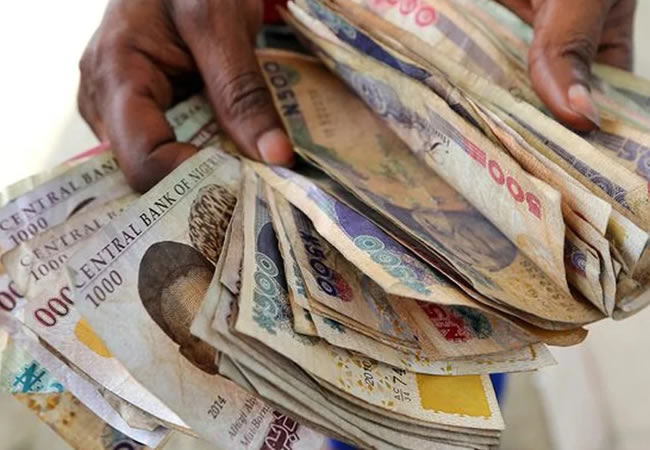
A proposal by the Revenue Mobilisation Allocation and Fiscal Commission to increase the salaries and allowances of top public office holders is highly insensitive considering Nigeria’s depressed economy. According to RMAFC Chairman, Mohammed Shehu, the commission is in the final stages of raising the pay of various cadres of public officers – from the President to his deputy, and the Chief Justice of Nigeria to governors, and others. Amid widespread concerns that Nigeria is home to the largest number of extremely poor in the world, the upward review in the pay of a few pampered government functionaries now beggars belief.
Shehu’s argument that the salaries of public office holders have not been reviewed since 2008 is to be taken with scepticism. The perks attached to public office in Nigeria are deemed by many to be excessive; some should be reviewed downwards, and others slashed outright. More importantly, the prevailing economic adversity demands sacrifices by public officials and sharp cuts in public expenditure, and definitely not bigger pay packets.
An exception: there are strong arguments backing a pay rise for judicial officers, of which insulating them from corrupt inducement is the chief. There is no convincing one for other public officers whose poor service delivery over the years has driven the country to ruin and its people into poverty and debt.
The RMAFC proposal is potentially disastrous because the increment is not tied to any new source of revenue. Nigeria is losing money on oil, its mainstay. Owing to massive theft, the Federal Government said Nigeria lost N287.95 billion in the third quarter of 2022. As of Q2 2022, its debt hit N42.84 trillion. The government borrows heavily to pay salaries and spends over 90 per cent of revenue servicing debts. An increment of any kind for public office holders is therefore bad economics.
Her plan to gift £45 billion in unfunded tax cuts recently cost Liz Truss her job as British Prime Minister after only six weeks in office. Her economic plan had sparked a fall in the pound and higher borrowing costs. Therefore, the RMAFC and the President, Major General Muhammadu Buhari (retd.), the governors and the lawmakers need to give the Nigerian taxpayer a concrete source of funding for their spending plans.
With no electricity – transmission capacity has stalled at 4,000 megawatts for years – to aid the productive sectors, poor roads and scanty rail networks, a World Bank report concluded that Nigeria needed a consistent spending of $10 billion annually for 30 years to fix its decrepit infrastructure.
But officials have stubbornly refused to cut their luxurious lifestyle despite the suffocating poverty among the populace. The Presidential Air Fleet of at least eight aircraft is larger than those of many domestic commercial airlines.
Lawmakers are neck-deep in the heist. The Economist of London already lists Nigeria’s lawmakers as the highest paid in the world. It is therefore provocative to consider increasing their pay packets. By law, the former governor of states like Akwa Ibom, Lagos, Edo, Rivers and Kwara receive huge pensions for life, excluding cars at regular intervals. For an official that served for a maximum of eight years, this makes no sense. Civil servants work for 35 years and some die in pension queues.
Nigeria has suffered two recessions in five years under Buhari, and the economy remains in a bad shape on all fronts. The World Bank recorded a 3.6 per cent GDP growth for Nigeria in 2021.
Citing insolvency, many states are not paying the N30,000 national monthly minimum wage, whose implementation commenced in 2019. Pensioners in Benue State say they have not been paid for 75 months. Many other states have backlogs of unpaid salaries and pensions. Some states deduct workers’ pension contributions and fail to remit to the pension fund.
While public office holders are contemplating a review, there is no economic justification on the ground to sustain the outlandish undertaking. In 2018, the World Poverty Clock named Nigeria as the extreme poverty capital of the world with 87 million persons living below the World Bank threshold of $1.90 per day, overtaking India. The World Bank projects three million more Nigerians to fall into the extreme poverty hole in 2022.
Believed to be understated, unemployment is 33.3 per cent, and youth unemployment is worse at 42.5 per cent. In September UNESCO raised its estimate of Nigeria’s out-of-school children population to 20.2 million, second only to India. At 20.77 per cent, inflation hit a 17-year high in September; the CBN benchmark lending rate is 15.5 per cent. The times call for belt tightening, not extravagance.
The RMAFC is chasing shadows. Former presidents, governors and their deputies, and the military top brass enjoy unusually high benefits. A calculation by this newspaper estimated the severance package of Buhari, governors, lawmakers, and political appointees at N63 billion in 2023. About N23.57 billion is allocated to purchase new vehicles in 2023, N1.07 billion higher than the N22.5 billion budgeted in 2022.
Responsible leadership is required to get Nigeria out of its economic troubles, but Buhari is demonstrably unconcerned as seen in his priorities, the opposite of the frugality he deceptively portrayed before assuming power. He frequently undertakes international trips at a great cost to the treasury. This is illogical for a country that is surviving on debt. In September, Buhari reportedly attended the UN General Assembly in New York with a large retinue.
For 2023, the Presidency will spend N508.71 million on ‘foodstuffs and refreshments’. There is no justification to increase the salaries of these officials. In the United States, presidents pay for the meals of their family members staying with them in the White House. In 2014, the then president, Barack Obama, paid for the Thanksgiving Day party he held from his own pocket. That is sensible.
Therefore, the RMAFC should abort the plan, and engage itself in desirable projects. Nigeria’s economic distress demands real leadership, not buccaneers focused on self-indulgent luxurious living at public expense.





